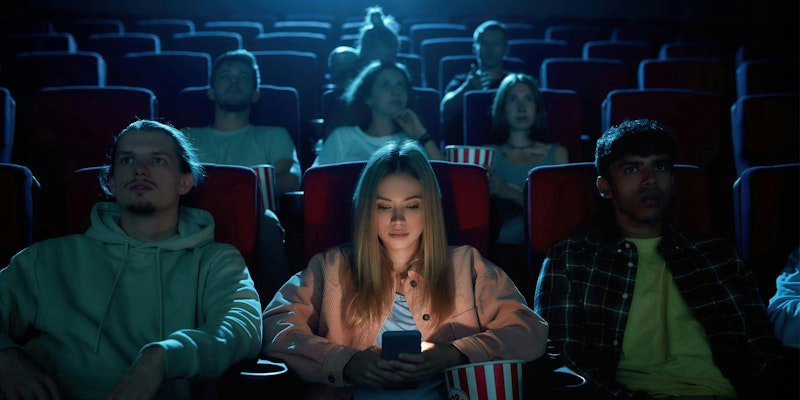If the Los Angeles Times is to be believed—and I wouldn’t believe any of them—Winona Ryder's got a problem. The young actors she's working with these days can't be bothered to sit through a movie. "How long is it?" they ask, like a snot-nosed kid being dragged to church. It's enough to make a cinephile weep. "Too bad, so sad," I say.
Ryder’s been in pictures since she was a teenager. Hit it big in Beetlejuice back in '88, now she's doing the sequel. In between, she's done some light shoplifting and seen the whole business change. Used to be, young actors would study the greats. They'd watch old flicks, learn their craft. Now? They're too busy timepassing and doomscrolling on their phones to bother.
It's not just Ryder noticing this. Millie Bobby Brown, the Stranger Things kid who's all grown up now, admits she can't even sit through her own movies. Her brain gets fidgety, she says. Imagine that—starring in a picture you don't have the patience to watch. Almost like writing an article you’ll never read. And who would dream of that, am I right?
This is the way things are going. Everything's getting shorter, faster, more bite-sized. Watched it? I haven’t even reviewed it! Pretty soon movies will be just a series of quick clips of genitals and pratfalls, like all those social media videos you see on your phone. Blink and you miss it.
The attention spans are shrinking along with the running times. People can't focus their edging and gooning on anything longer than a TikTok video. Even porn is getting condensed down to five-second money shots. It's junk food for the brain.
It's not just youths, either. Adults are losing their ability to sit through longform content. You see them in the theater, checking their phones, getting up for snacks. My cousin spends the first half of a movie placing all his online bets, goes out to his car to take a nap in the middle, and then comes back for the post-credits clip.
Maybe one day, the machines will be the only ones with the patience to watch a whole movie or TV show. They'll spit out a one-word review for us humans with our gnat-sized attention spans. "Okay," the computer will say. And that'll be enough, okay even. "It’s okay by me," as a former student once said when I asked him if his incoherent writing struck him as acceptable.
It's a bleak picture, but that's the direction we're headed. The kids coming up now, they're wired differently. They don't know a world without phones and social media. Trying to get them to watch an old movie or show is like asking them to churn butter or use a rotary phone. But why would you?
To an extent, you've got to feel for the creatives. Some of them are pouring their hearts into these productions, spending years of their lives, and for what? So some kid can watch it in chunks on their phone while they're riding the bus? Scorsese has lamented that phenomenon, but he’s a fossil on the way out. So are the rest of us, come to think.
And hey, this is just evolution. Maybe our brains are adapting to process information faster. Could be that in 50 years, our Neuralink devices will enable us to watch three-hour epics that move at the speed of light and we'll wonder how anyone ever sat through those slow two-hour movies and 10-hour premium TV shows.
But right now, we're losing something. The shared experience of cinema—sitting in a dark room with strangers, all focused on the same story—that's fading away. Replaced by an endless stream of algorithmically personalized content, tailored to your exact tastes in posting and gooning.
You've got to wonder what this means for society. We're already divided, living in our own bubbles. If we can't even agree on what movies and shows to watch—let alone bother to watch them—how are we supposed to come together on the big issues, like which city has the best pizza?
And what about the art of storytelling? A good story, people who make their livings from storytelling say, can change the way you see the world. It can make you think, make you feel. But if we're all just watching bite-sized clips of "bobs" and "vagene," are we missing out on those experiences? The storytellers will certainly be missing their pay envelopes if this keeps up.
The technology, it's moving faster than we can keep up. Every day there's a new app, a new platform, a new way to consume content. It's like trying to drink raw milk from a fire hose. No wonder people are getting overwhelmed, retreating into spank banks and goon caves.
Maybe, some say, this is just a phase. Maybe we'll swing back the other way, with people craving longer, more immersive experiences. Virtual reality, augmented reality—they could bring back that sense of event, of shared experience. I wouldn’t bet the farm on it. At best, we’ll get more used to being alone together.
The genie's out of the bottle. There's no going back to the way things were. Ryder and her actor pals can lament all they want. In a few years, a two-hour movie or 22-minute show will seem as quaint and outdated as vaudeville. The actors will all be deepfakes, the scripts will be courtesy of Claude or ChatGPT, and the audience will be nothing but other AIs looking to plagiarize that work as they respond to AI-generated prompts.
That's the content game for you. Always changing, always trying to capture the most eyeballs with the least effort. Right now, the next big thing is making everything smaller, as microscopic as what’s left of our attention spans. Welcome to the brave new world of 2024, when we can watch Casablanca or Andrei Rublev whenever we want—only nobody wants to watch crap like that. God help us all.

